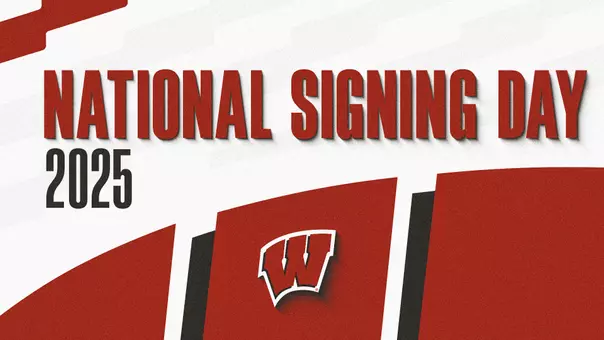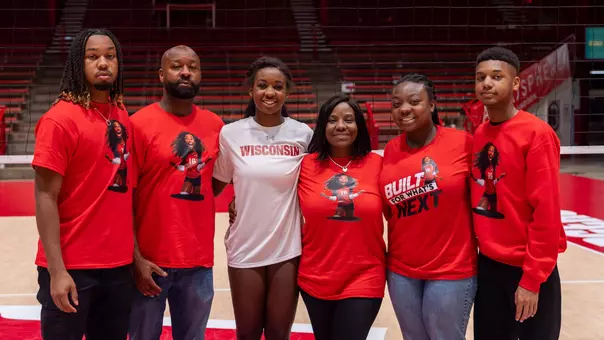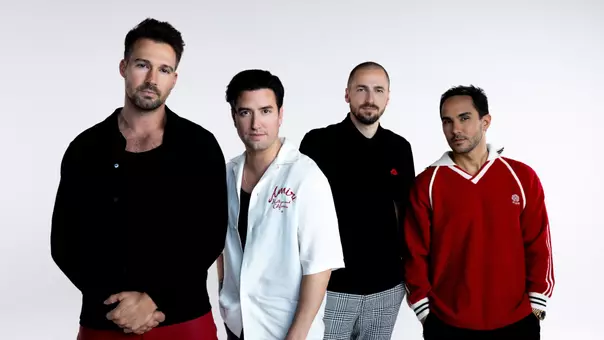UW Athletic Hall of Fame Class of 2015: Paula Bonner
September 03, 2015 | General News
 | ||
|
August 12, 2015
BY MIKE LUCAS
UWBadgers.com
MADISON, Wis. -- If it takes a Hall of Famer to know a Hall of Famer then Sue Ela, Class of 2011, is in good company with Paula Bonner, Class of 2015. And if it takes a former coach to shine a light on the accomplishments of a former administrator then Ela, the former women's rowing coach, is the right person to speak on the influence of Bonner, the former women's associate athletic director.
"She's got Badger blood flowing through her veins," Ela said.
That's cutting to the chase. But there's so much more to know about Bonner, the president and CEO of the Wisconsin Alumni Association. For starters, there's the impact that she had on the growth of women's athletics at Wisconsin, dating back to the mid-`70s when Bonner formed a tag-team with Dr. Kit Saunders-Nordeen, another Hall of Famer and the school's first athletic director for women.
"Kit and Paula," Ela said, "basically built the women's athletic department. I have to say as a coach in the early years that they both had our back." They were advocates? "Oh, man, absolutely," she went on. "The early years were rather difficult for the women's coaches. In a way, Kit and Paula did the hard work. We had the fun stuff where we got to build the teams and work with the kids."
| Get Varsity Magazine | |||
|
Ela agreed that Saunders-Nordeen and Bonner didn't get enough credit as visionaries, especially after the enactment of Title IX in 1972. "They did what they had to do," said Ela, one of the founding members of the women's rowing club, a champion rower after it became a varsity sport, and a coach for nearly two decades. "Beyond that, certainly, they were paving the way for those who came later."
Thinking back on those transitionary years, Bonner said, "I was a young pup and Title IX was fresh and new. Like anything getting started, it was fun to be on the ground floor. We just had a great time. It was less formal and we had fun but we were serious about building women's athletic teams."
The climate today is much different than it was in the `70s when the women were attempting to establish their identity on what had been exclusively male turf. For historical perspective, the NCAA and Big Ten didn't even recognize women's athletics or sanction championship events until 1981-82.
"I'd say it was very positive on the campus from faculty and staff," Bonner said. "All in all, the men's athletic department melded in ... there were some episodes of anger and frustration between a men's coach and a women's at times trying to sort out shared facilities and practice times.
"We had an episode with the crew team, unbeknownst to me and Kit, where they walked into Elroy Hirsch's office and started disrobing in complaint of not having a locker room; something we had been working on. But their activities made that happen.
"There were just a lot of gracious and helpful people in the department. We had it pretty darn good. I felt Madison was one of the more progressive places I had ever lived. And when I got here, I thought I had died and gone to heaven."
Bonner never strayed from her commitment to the student-athletes through thick or thin.
"She had their backs, too," Ela said.
She also had a plan.
"Paula was always working hard to make sure we had what we needed to succeed and be number one," Ela said. "There were a lot of improvements during those years. There are times when you have to look back and realize the contributions that people like Paula made and continue to make."
Bonner's gregarious personality has always been one of her most disarming qualities.
Ela referenced, "That, y'all Southern drawl and that laugh and positive attitude."
They're all distinguishing characteristics, especially her positivity, a valuable trait in athletics.
Reiterated Ela, "She just always genuinely had our backs. She was for us. She was for our team. She was for women. She was for Wisconsin. She was a real builder of success. I absolutely believe that she has been an ambassador for the University of Wisconsin wherever she has gone."
...
That Southern drawl is a remnant of Bonner's upbringing in the "Low Country" -- she was raised in Moncks Corner, South Carolina, 20 miles from Charleston. Her dad was a principal, math teacher and the boys and girls basketball coach at small high school in Greeleyville.
"I never really think a lot about the south as being cutting edge," she said. "But, ironically, they started having the state girls basketball tournament in South Carolina as early as 1940."
After graduating from the University of North Carolina-Greensboro, Bonner came to Madison to work on her Master's in August of 1976. A year later, Saunders-Nordeen and Otto Breitenbach, the chief assistant to athletic director Elroy Hirsch, brought her aboard as a part-time administrative assistant. That rolled over to a full-time position and more exposure to Saunders-Nordeen's management style.
"Kit helped me meet people and know people and that helped me get wired in more quickly," said Bonner. "She had a great sense of sportsmanship and competitiveness which I admired from the beginning. She was feisty. But, at that point, I was younger and really feisty.
"She was good at times in not letting me get too far out of bounds during what was kind of a pioneering, activist period of time for women's athletics. And I loved that. Kit gave me a lot of freedom to do what I wanted to do to help make connections on campus and build support of women's athletics. If she saw me going a little bit too far, she'd rein me in. We had a good back-and-forth partnership."
In 1983, Saunders-Nordeen was named an associate athletic director for men's and women's sports, a position that she held through 1991. Bonner, in turn, became the overseer of the 11 women's sports teams at a stage, she observed, when they were equated with 11 men's non-income sports, an evolution of the Title IX interpretation.
Regarding the model, Bonner said, "I certainly had a big vision and dreams about what it should look like. I expected more parity for resources, for coach's salaries. And I thought there was really no limit to how much better women's athletics could become if they just had more opportunity to do so."
For context, Bonner said, "When I left the athletic department on June, 30, 1989, the budget for the whole department was $14.2 million. I've watched it escalate over time (It was $104.6 for 2014-2015) and seeing the growth in all of this is amazing. When you see the kind of support the women's teams have, it's great, and it's far beyond anything I would have imagined."
Bonner can look back proudly on her efforts in the area of marketing and promotion. Along with Barbara Wagner, she co-hosted a weekly Badger women's sports show in a back room of the Brat and Brau on Regent Street. "That was just a blast," she said, "and it really helped get the word out more."
She's still getting the word out -- to Wisconsin alums everywhere.
"It's one of the best possible jobs a person can have," Bonner said. "The alumni that I have met all over the world are fantastic people doing great things. I love what a difference this place (the UW) makes in the world. I have felt it (her job) has fit me like a glove."
She has the best of two worlds; what she called the "two sides of the coin."
"I like working in some serious ways with the chancellor's office and with some deans internally on campus," she said. "I also love the aspect of being able to take a more fun-loving, cheerleader aspect of my personality and putting it out there to keep up spirits and motivate."
If you've ever been to a Badger pep rally, y'all have seen that side of her.














